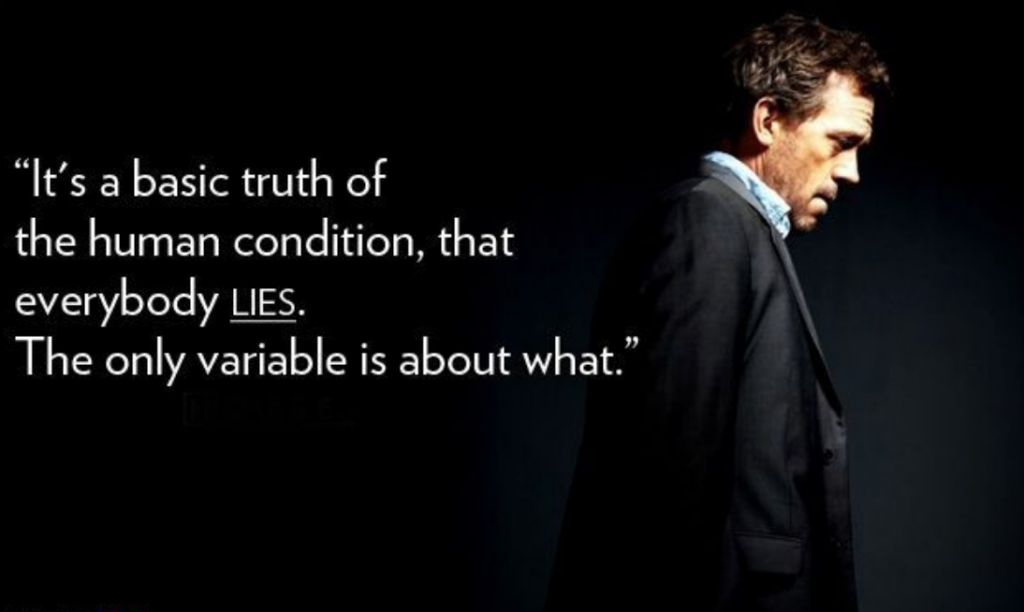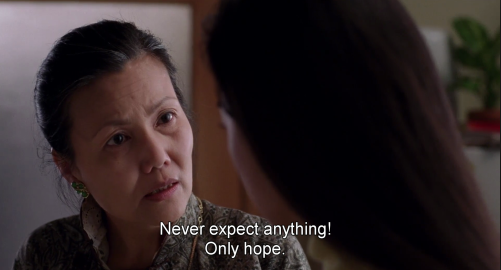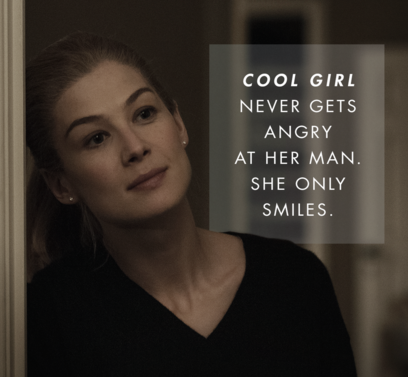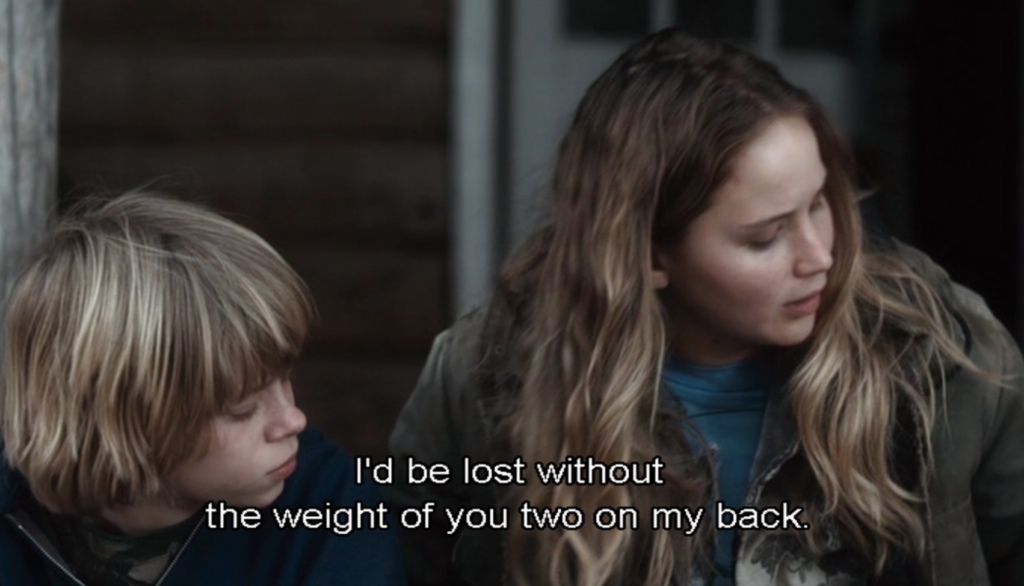
Secret-keepers have what it takes to be legendary storytellers. Stories aren’t solely about pretty writing, glorious description, or witty banter. Excellent stories are about one thing and one thing only….CONFLICT.
Want to know the secret ingredient that turns responsible adult readers into reckless maniacs willing to stay up until DAWN to finish a book…on a work day?
TENSION.
Secret-Keepers Resist the Urge to Explain

Secret-keepers learn to resist the urge to explain, which we’ll talk about in a moment. Before any deception even comes into play, we—as authors—must make sure we cast jacked up people in our story. To be blunt, perfectly well-adjusted, responsible people are dull.
We want to deliver a powerful story not a powerful SEDATIVE.
This said, it’s tempting for us to create perfect protagonists and pure evil antagonists, but that’s the stuff of Looney Tunes cartoons and low budget 70s Spaghetti Westerns…not great fiction.
First of all, we want our characters to ‘feel’ real. In order to feel real, they must come with baggage (um, like real people do).
In some genres this baggage may be carry-on only (I.e. cozy mystery). Other genres require a cast with enough baggage to require military aircraft hangars (I.e. literary fiction, certain types of speculative fiction).
Also, remember that life isn’t black and white. We’re wise to appreciate that every strength has an array of corresponding weaknesses and vice-versa. When we understand these soft spots, generating conflict becomes easier. Understanding character arc becomes simpler.
Plotting will fall into place with far less effort.
One element that is critical to understand about legendary storytelling is this:
Everyone Has Secrets

All good stories hinge on secrets.
I have bodies under my porch.
Okay, not all secrets in our fiction need to be THIS huge (again look to genre). Alas, the skilled author understands how powerful secrets can be and hones his/her abilities to be superior secret-keepers.
Skilled writers never part with anything the reader doesn’t work for.
Real Self vs. Authentic Self

We all have a face we show to the world, what we want others to see. If this weren’t true then my author picture would have me wearing a Star Wars t-shirt, yoga pants and a scrunchee, not a beautifully lighted photograph taken by a pro.
We all have faces we show to certain people, roles we play. We are one person in the workplace, another with family, another with friends and another with strangers.
This isn’t us being deceptive in a bad way, it’s self-protection and it’s us upholding societal norms. This is why when Grandma starts discussing her bathroom routine, we cringe and yell, ‘Grandma! TMI! STOP!’
No one wants to be trapped in a long line at a grocery store with the stranger telling us about her nasty divorce. Yet, if we had a sibling who was suffering, we’d be wounded if she didn’t tell us her marriage was falling apart.
Yet, people keep secrets. Some more than others.
In fact, if we look at The Joy Luck Club the entire book hinges on the fact that the mothers are trying to break the curses of the past by merely changing geography.
Yet, as the daughters grow into women, the mothers see the faces of the same demons wreaking havoc in their daughters’ lives…even though they are all thousands of miles away from the past (China).
The mothers have to reveal their sins, but this will cost them the ‘perfect version of themselves’ they’ve sold the world and their daughters (and frankly, themselves).
The daughters look at their mothers as being different from them. Their mothers are perfect, put-together, and guiltless. It’s this misperception that keeps a wall between them. This wall can only come down if the external facades (the secrets) are exposed.
Secret-Keepers See & Craft the False Face

Characters who seem strong, can, in fact, be scared half to death. Characters who seem to be so caring, can in fact be complete psychopaths using the false face for personal gain/entertainment (great fodder for incredible villains).
Other characters who seem loving, generous and selfless might be acting out of guilt, shame, or as penance, not out of any genuine concern for others. The over-achiever who excels at everything might not be at ALL confident, rather terrified and haunted by feelings of being a fraud.
We all have those fatal weaknesses, and most of us don’t volunteer these blemishes to the world.
The woman whose house looks perfect can be hiding a month’s worth of laundry behind the Martha Stewart shower curtains. Go to her house and watch her squirm if you want to hang your coat in her front closet.
She wants others to think she has her act together, but if anyone opens that coat closet door, the pile of junk will fall out…and her skeletons will be on public display.
Anyone walking toward her closets or asking to take a shower makes her uncomfortable because this threatens her false face.
What is the secret your MC will do ANYTHING to protect? Find that, then expose her.
Secret-Keepers FEAST on False Guilt

Characters can be driven to right a wrong they aren’t even responsible for. In Winter’s Bone Ree Dolly is driven to find her father before the bail bondsman takes the family land and renders all of them homeless.
Ree is old enough to join the Army and walk away from the nightmare, but she doesn’t. She feels a need to take care of the family and right a wrong she didn’t commit. Ree has to dig in and dismantle the family secrets (the crime ring entrenched in her bloodline) to uncover the real secret—What happened to her father?
Dolly has to keep the family secret (otherwise she could just go to the cops) to uncover the greater, and more important secret. She keeps the secret partly out of self-preservation, but also out of guilt and shame.
Paula Hawkin’s The Girl on the Train uses false guilt for max effect. MC Rachel’s entire life is a lie built on a foundation of authentic shame (she’s a raging alcoholic with no job pretending to be functioning) and false shame (her alleged ‘sins’ that have driven her to the bottle). Her desire to right a wrong she has nothing to do with (solve the murder of a total stranger) is, again, propelled by shame.
Be a GOOD Secret-Keeper
Secrets are SO powerful when it comes to storytelling, which is one of the reasons I HATE flashbacks. Oh, but my readers want to know WHY my character is this way or does thus-and-such.
No. No they don’t. They want to be tortured. Just trust me.
And, for the record, flashbacks are not the same as non-linear plotting. Also, the flashbacks I loathe are what I call ‘Training Wheel Flashbacks’ (since the sole reason they exist is to prop up a weak story).
What is a Training Wheel Flashback? It’s when any POV character is ‘thinking back in time’ for the sole purpose of EXPLAINING and diffusing tension. You spot one of these suckers?
CUT!
Before AT LEAST 2/3 of the way through Act Two, any shift back in time should ideally present MORE conflict, questions, unresolved issues. Should you part with any answers, my advice is to replace them with at least two more questions. Otherwise, all that tension bleeds out because the reader is satisfied.
Pro Tip: The ONLY acceptable time for a reader to be satisfied is after the last page and the five-star review they HAVE to give your book.
If we’re ONLY shifting back to explain why Such-And-Such doesn’t trust, acts like an @$$hat, or has an unhealthy obsession with all things Julio Iglesias, we’re diluting our own secret sauce.
We’re dampening that fire that propels our readers want to press on so they can know WHY.
Yes, our readers WANT to know WHY, but we are under no obligation to tell them immediately or…ever (depending on genre or if we have a series). In fact, non-linear plotting is one of THE BEST ways to be an almost SADISTIC secret-keeper, which is why it’s the preferred structure of certain genres.
*nods to The Bird Box* #SheerGenius
***FYI: I am teaching a class on non-linear plotting, and how to properly apply the flashback this Saturday. And, as always a FREE recording included with purchase 😀 .

Where was I?
Yes. Here’s the thing, The Spawn wants cookie sprinkles for breakfast. Just because he WANTS something, doesn’t mean it’s the best thing for him. Don’t tell us WHY…even though we beg.
Expert secret-keepers reveal pieces slowly, but remember. Once secrets are out? Tension dissipates. Tension is key to maintaining story momentum. We WANT to know WHY, but it might not be good for us.
The Force was more interesting before it was EXPLAINED.
Everybody LIES

Yes. Yes I do.
They can be small lies, ‘No, I wasn’t crying. Allergies.’ Lies of omission. White lies. They can even be BIG lies, ‘I have no idea what happened to your father. I was playing poker with Jeb.’ Fiction is one of the few places that LIES ARE GOOD. LIES ARE GOLD.
Fiction is like dating. If we tell our date our entire life story on Date #1? Mystery lost and good luck with Date #2.
When it comes to your characters, make them lie (even if it’s only to themselves). Make them hide who they are. They need to slowly be open to seeing their true self, and—like in life and when WE go to therapy—the characters will do everything to defend who they believe they are.
Remember the inciting incident creates a sort of personal extinction. The protagonist will want to return to the old way, even though it isn’t good for them.
Again. Resist the urge to explain.
Feel free to write backstory/secrets out for your benefit…but then HIDE those babies from the reader. BE SECRET-KEEPERS. Secrets rock. Secrets make FABULOUS fiction.
What are your thoughts? Questions?
What are some great works of fiction that show a myriad of lies from small to catastrophic? Can you think of what your character’s ‘false face’ is? What is the lie that defines him or her?
Can you craft their self-delusion? Is there a weakness or weaknesses that they dare not show (but by not showing it, is ultimately inhibiting growth)?
Also, THANK YOU SO MUCH for your enthusiastic support! Y’all ROCK!
I’ve written five books, almost 2,000 blogs, millions of words, and it’s all because y’all subscribe HERE, share these posts, and take classes (which keeps me gainfully employed and off the streets so I can write MORE BLOGS for y’all to enjoy).
If you haven’t already, please subscribe to the blog (look in the sidebar), share it with your fellow writers via social media, and make sure to sign up for a CLASS! We have a ton of fun and I include a free recording just so you can enjoy the class and go back and review and study at your leisure.
***BTW, CONGRATULATIONS! December’s winner of my comments contest is Kat Kent. Please send your 5000 word WORD doc to kristen at wana intl dot com. Double-spaced, one-inch margins, and Times New Roman Font.
JANUARY & FEBRUARY’S AWESOMENESS (CLASSES)
Self-Publishing for Professionals
Taught by USA Today Best-Selling Author Cait Reynold’s on Friday, January 11th 7-10 PM EST PLUS EXTRA GOODIES ($100 for THREE hours of training plus bonus material). The LIVE class has passed, but the recording and bonus material is available with the BUNDLE.
The Business of Writing
Taught by Kristen Lamb on Saturday, February 2nd 1-3 PM EST ($55)
***GET ALL THREE (Self-Publishing for Professionals Jan. 11th, The Business of Writing Feb. 2nd & Pitch Perfect Feb. 7th) IN THE PUBLISHING TRIPLE THREAT BUNDLE for $155
Story Master: From Dream to Done
Taught by Kristen Lamb, Saturday, January 12th, 1-3 PM EST
Social Schizophrenia: Building a Brand Without Losing Your Mind
Taught by Kristen Lamb, Thursday, February 21st, 7-9 PM EST ($55 General Admission/ $195 GOLD)
Yes, I will be teaching about Instagram in this class.
A Ripple in Time: Mastering Non-Linear Plotting
Taught by Kristen Lamb, Saturday, January 19th from 1-3 PM EST $55
Harnessing Our Writing Power: The BLOG!
Taught by Kristen Lamb, Thursday, January 24th 7-9 PM EST $55 General Admission/ $195 GOLD
Fiction ADDICTION: The Secret Ingredient to the Books Readers CRAVE
Taught by Kristen Lamb, Saturday, January 26th 1-3 PM EST $55
SALES: For Those Who’d Rather Be Stabbed in the Face
Taught by Kristen Lamb, Thursday, January 31st 7-9 PM EST $65
The Business of Writing
Taught by Kristen Lamb on Saturday, February 2nd 1-3 PM EST ($55)
Pitch Perfect: How to Write a Query Letter & Synopsis that SELLS
Taught by Kristen Lamb on Thursday, February 2nd, 7-9 PM EST ($55)
For those who need help building a platform and keeping it SIMPLE, pick up a copy of my latest social media/branding book Rise of the Machines—Human Authors in a Digital World on AMAZON, iBooks, or Nook.









7 comments
6 pings
Skip to comment form
Wow this is amazingly helpful. I never thought of it in that way. Keeping secrets. I’m big on trying to figure out the plot before it is revealed, so it makes sense to do that in my own writing. I just had a terrific idea for a story I am working on. Thanks Kristen. I love your blog.
And that’s why Big Little Lies is on my “want to read” list 🙂
Thanks for sharing in your unique way, excellent post!
Author
That is a FANTASTIC book. LOVED it in audio, so consider an Audible membership if you don’t already have one *wink, wink*
I see this even in romance. Reading a terrific book by Tessa Dare right now, and while you know what’s going on with the hero, the heroine’s past is still shrouded in mystery. She gives you tantalizing glimpses, but not the whole story.
As you said, it doesn’t have to be bodies under the porch. Each genre is a little different, but it holds true for all of them.
This was awesome advice, Kristen! Thank you for sharing it with us. In the series about Tergaenae that I’m writing at the moment, I’ve got so many secrets to keep, I hope I can keep track of all of them. It’ll be a fun challenge. Especially revealing the right secret at the right time. 😀
You’re awesome, Kristen. That’s an established fact. :>
Thanks for this great reminder about keeping those secrets. Now that I’m working on my own novel, it’s something I’ll be sure to keep in mind as I get through this first draft and then decide in subsequent drafts where and when to torture my readers with what.
Humm. My plan was to drip in the backstory a little at a time throughout the book giving info a little at a time, while bringing up more questions.
Should I change this into the occasional inner thought and dialogue?
I have a writer friend that took the time to do several critiques and most of what she didn’t like was that I’m not giving enough back story and the reasons why the maun pov is doing things.
I thought I was giving out enough information without giving too much away, but now after reading this article wonder if I should keep doing what I’m doing or scrap the flashbacks?
Off toppic:
Is it a problem if the first three or so chapters move at a hectic pace before slowing down? The only way the first chapter worked was tossing the main pov right into fire, the second chapter what happens after, third chap. She runs into the co-main character, then later on it switches to that character and finally slows down a little.
I can’t see any spot before then where I’d make sense for them to think about much more then how not to get killed and escape.
Yet my friend is saying I need to and why it’s bad.
I understand what she’s saying and why but can’t figure out how until several chapters later. So far I haven’t applied any of the proposed changes as it doesn’t feel right.
Needless to say she’s a bit annoyed. *Sigh*
Any advice on what to do would be appreciated.
For now I’m just going to leave things as they are as when I did try it didn’t seem to fit and I changed things back.
[…] Secret-Keepers: Generate Page-Turning, Nerve-Shredding Tension and Rest for Success and Why Busy is Seriously Overrated by Kristen Lamb […]
[…] Continue reading here […]
[…] Characters are ever-important. Laura Benedict looks into creating characters: you can always start with the car, and Jami Gold suggests making characters unique with layering, while Kristin Lamb says secret-keepers generate page-turning, nerve-shredding tension. […]
[…] here’s a link to the other blogger’s post. It’s all about how and why to write secrets for your […]
[…] plot. Why do we need first and last names for all these girls (and sometimes nicknames for them)? What purpose is served by even relating Sam’s school […]
[…] We don’t know what this QH is, other than some sort of super being. OH-KAY. Remember how I preach, and preach and preach about how superlative storytellers excel at being amazing secret keepers? […]